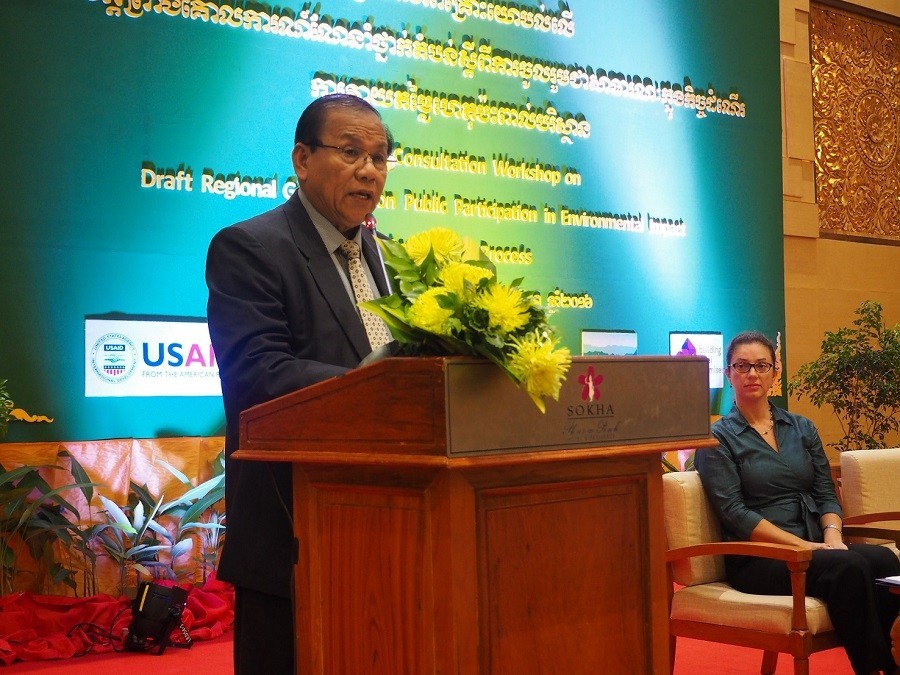PHNOM PENH, CAMBODIA October 28, 2016 – In a landmark move for public participation in Cambodia, the government and civil society jointly held public consultations on regional guidelines to ensure Environmental Impact Assessment (EIA) processes involve affected communities.
More than 100 representatives from private sector companies, communities, civil society organizations, government agencies, environmental impact assessment consulting firms gathered today at a public consultation in Phnom Penh to provide feedback on draft Regional Guidelines on effective Public Participation in Environmental Impact Assessment processes as a way to ensure these processes involve communities.
The participants’ input will help improve an effort that is seen by many as critical for the region to address the environmental and social impacts of the growing array of regional development projects such as dams, mines, power plants, and industrial zones.
“Public participation in decisions related to the design and implementation of infrastructure is not only a good idea, it is also good for the economy,” noted Ms. Sandra Stajka, Director, Food Security and Environment Office, USAID/Cambodia. “It’s important that those who are affected by these decisions are involved in the process.”
As the region experiences a period of rapid economic growth and increasing foreign direct investment in infrastructure projects, the regional environmental impact assessment guidelines are being developed in response to a shared concern about the social and environmental impacts of those projects. Communities and experts throughout the region have been reporting severe negative impacts on natural resources, fish populations, agriculture, community health and culture.
While environmental impact assessment is implemented in all lower Mekong countries, it is often hampered by a lack of effective public participation. This gap can result in adverse social and environmental impacts, project delays, and conflicts with communities, all leading to costs and risks for investors and governments.
“The most important thing is the quality of participation. In these guidelines, we can see participation at all levels, and we want to ensure the quality is strong, especially on issues related to community impacts,” commented Sambo Choun of Indigenous Community Support Organization (ICSO), a Cambodian civil society organization. “Along with government and developers, communities need the power to influence a project.”
Participants from NGOs, communities, government and business discuss the best ways to ensure the public have a role in environmental impact assessment processes.
The Regional Guidelines on Public Participation in Environmental Impact Assessment have been drafted by a multi-stakeholder Regional Technical Working Group. Formed in August 2015 with support from the USAID-funded Mekong Partnership for the Environment, the working group includes 25 civil society and government representatives from across the five lower Mekong countries, along with national advisors and technical experts including from the U.S. Environmental Protection Agency and European Union.
Today’s consultation was the final in a series being held across all of the Lower Mekong countries of Cambodia, Lao PDR, Myanmar, Thailand and Vietnam throughout October. The consultations provide investors, environmental impact assessment practitioners, communities, NGOs, government departments and others the opportunity to review and provide feedback on the draft guidelines. The draft guidelines are also available for public feedback via an online platform (mekongcitizen.org/EIA) through October 31.
After the public comment period has closed, the working group will revise the guidelines based on public input received. Once finalized, the work will turn to ensuring these guidelines are implemented by developers and used by governments to complement and improve national policies and practices.
The working group is supported by the USAID-funded Mekong Partnership for the Environment, implemented by Pact in partnership with the Asian Environmental Compliance and Enforcement Network and regional governments and civil society organizations. MPE supports constructive engagement among business, government and civil society to facilitate socially and environmentally responsible development in the Mekong region.
For more information:
- Contact: Adam Hunt, Media and Communications Director, Mekong Partnership for the Environment: ahunt@internews.org
- For more on the Regional Technical Working Group on EIA, visit:http://mekongcitizen.org/about/mpe/rtwg-on-eia/
- Read: USAID’s MPE fact sheet:http://www.usaid.gov/asia–regional/fact–sheets/mekong–partnership–environment
- Visit: Pact’s MPE information page: http://www.pactworld.org/mpe
Lead Photo: H.E. Sou Souvuth, Undersecretary of State, Ministry of Environment gives opening remarks at the Phnom Penh consultations. (Photo: MPE)
See media coverage in English: The Phnom Penh Post
and in Khmer: Radio Free Asia -Khmer, Thmey Thmey, VAYOFM and FAN Khmer
Press Release in Khmer language
សម្រាប់ការផ្សាយបន្ទាន់
សេចក្តីប្រកាសព័ត៌មាន
រដ្ឋាភិបាល និងអង្គការសង្គមស៊ីវិលកម្ពុជារៀបចំសិក្ខាសាលាថ្នាក់ជាតិលើកទីមួយលើការអភិវឌ្ឍហេដ្ឋារចនាសម្ព័ន្ធ
ថ្ងៃទី ២៨ ខែតុលា ឆ្នាំ២០១៦ នេះ នៅទីក្រុងភ្នំពេញ អ្នកតំណាងមកពីរដ្ឋាភិបាល និងអង្គការសង្គមស៊ីវិលបានសហការរួមគ្នារៀបចំសិក្ខាសាលាពិគ្រោះយោបល់លើកទីមួយនៅទីក្រុងភ្នំពេញ ដើម្បីប្រមូលមតិយោបល់ទៅលើសេចក្តីព្រាង គោលការណ៍ណែនាំថ្នាក់តំបន់ស្តីពីការចូលរួមជាសាធារណៈប្រកបដោយអត្ថន័យនៅក្នុងកិច្ចដំណើរការវាយតម្លៃហេតុផលប៉ះពាល់បរិស្ថាន។
នៅពេលបញ្ចប់ គោលការណ៍ណែនាំនេះនឹងជួយធានាថាសំលេងរបស់សហគមន៍មូលដ្ឋាន ទាក់ទងនឹងគម្រោងអភិវឌ្ឍហេដ្ឋារចនាសម្ព័ន្ធខ្នាតធំ ដែលនឹងមាននៅក្នុងតំបន់សហគមន៍របស់ពួកគាត់ ដែលគម្រោងទាំងនោះមាន ដូចជា ទំនប់ អាជីវកម្មរ៉ែ រោងចក្រផលិតអគ្គិសនី និងតំបន់ឧស្សាហកម្មជាដើមនោះ នឹងត្រូវបានលឺ។
លោកស្រី Sandra Stajka, នាយិកាការិយាល័យសន្តិសុខស្បៀង និងបរិស្ថាន នៃទីភ្នាក់ងារ USAID នៅកម្ពុជាបានមានប្រសាសន៍ថា “ការចូលរួមជាសាធារណៈនៅក្នុងការសម្រេចចិត្តទាក់ទងនឹងការរៀបចំ និងការអនុវត្តគម្រោងហេដ្ឋារចនាសម្ព័ន្ធ មិនត្រឹមតែជាគំនិតល្អនោះទេ ប៉ុន្តែវាក៏ល្អសម្រាប់សេដ្ឋកិច្ចផងដែរ។” លោកស្រីមានប្រសាសន៍ទៀតថា “ វាមានសារសំខាន់សម្រាប់អ្នកដែលទទួលរងផលប៉ះពាល់ពីសេចក្តីសម្រេចចិត្តទាំងនេះ ដែលអ្នកទទួលរងគ្រោះទាំងនោះគួរត្រូវបានចូលរួមក្នុងកិច្ចដំណើរការនេះ”អ្នកតំណាងមកពីវិស័យឯកជន សហគមន៍ អង្គការសង្គមស៊ីវិល ស្ថាប័នរដ្ឋ និងក្រុមហ៊ុនជំនាញការផ្នែកវាយតម្លៃហេតុប៉ះពាល់បរិស្ថាន បានចូលរួមនៅក្នុងសិក្ខាសាលាពិគ្រោះយោបល់លើ ផលប៉ះពាល់បរិស្ថាន និងសង្គមនៃការអភិវឌ្ឍន៍ហេដ្ឋារចនាសម្ព័ន្ធថ្នាក់តំបន់។
ស្របពេលដែលសេដ្ឋកិច្ចមានកំណើនដ៏ឆាប់រហ័ស និងការកើនឡើងការវិយោគពីបរទេសនៅក្នុងគម្រោងហេដ្ឋារចនាសម្ព័ន្ធ គោលការណ៍ណែនាំវាយតម្លៃហេតុប៉ះពាល់បរិស្ថានថ្នាក់តំបន់ គឺកំពុងត្រូវបានបង្កើតឡើង ដើម្បីឆ្លើយតបនឹងការព្រួយបារម្ភដែលបានលើកឡើងទាក់ទងនឹងហេតុប៉ះពាល់បរិស្ថាន និង សង្គមដែលបណ្តាលមកពីគម្រោងទាំងនោះ។ តាមរយះសហគមន៍ និងអ្នកជំនាញការណ៍ក្នុងតំបន់បាននឹងកំពុងរាយការណ៍ពីផលប៉ះពាល់អវិជ្ជមានលើធនធានធម្មជាតិ ធនធានជលផល កសិកម្ម វប្បធម៏ និងសុខភាពសាធារណៈ។
បើទោះបីជា ការវាយតម្លៃហេតុប៉ះពាល់បរិស្ថានត្រូវបានអនុវត្តនៅក្នុងបណ្តាប្រទេសក្នុងតំបន់មេគង្គក្រោម ភាពងាយរងគ្រោះតែងតែកើតមានឡើងដែលបណ្តាលមកពីការកង្វះខាតការចូលរួមជាសាធារណៈពេញលេញ។ ចន្លោះខ្វះខាតនេះបណ្តាលអោយកើតមានបញ្ហាសង្គម និងបរិស្ថាន ការពន្យាពេលរបស់គម្រោង និងការមានជំលោះជាមួយសហគមន៍ ដែលបញ្ហាទាំងអស់នេះបណ្តាលអោយខាតបង់ និងជាគ្រោះហានិភ័យសម្រាប់អ្នកវិនិយោគ ក៏ដូចជារដ្ឋាភិបាល។
អ្នកស្រី ជួន សំបូរ មន្រ្តីកម្មវិធីនៃ Indigenous Community Support Organization (ICSO) បានមានប្រសាសន៍ថា “គុណភាពនៃការចូលរួមជាសាធារណៈគឺមានសារសំខាន់។ យើងអាចឃើញការចូលរួមជាសាធារណៈមាននៅគ្រប់គម្រិតនៅក្នុងគោលការណ៍នេះ ហើយយើងចង់ធានាថាគោលការណ៍នេះមានគុណភាពខ្ពស់ ជាពិសេសបញ្ហាទាក់ទងនឹងផលប៉ះពាល់លើសហគមន៍”។ អ្នកស្រីបានមានប្រសាសន៍បន្តទៀតថា “ទាំងរដ្ឋាភិបាល និងអ្នកអភិវឌ្ឍន៍ក៏ដូចជាសហគមន៍ត្រូវការមានឥទ្ធិពលលើគម្រោង”
គោលការណ៍ណែនាំលើការចូលរួមជាសាធារណៈ នៅក្នុងការវាយតម្លៃហេតុប៉ះពាល់បរិស្ថានត្រូវបានពង្រាងដោយក្រុមការងារបច្ចេកទេសថ្នាក់តំបន់ដែលមកពីស្ថាប័នពាក់ព័ន្ធផ្សេងៗគ្នា។ ក្រុមការងារបចេ្ចកទេសត្រូវបានបង្កើតឡើងនៅខែសីហា ឆ្នាំ២០១៥ដោយគាំទ្រដោយគម្រោង ភាពជាដៃគូតំបន់ទន្លេមេគង្គសម្រាប់បរិស្ថាន (Mekong Partnership for the Environment) និងឧបត្ថម្ភដោយទីភ្នាក់ងារសហរដ្ឋអាមេរិកសម្រាប់កិច្ចអភិវឌ្ឍន៍អន្តរជាតិ(USAID)។ ក្រុមនេះមានសមាសភាព២៥នាក់ដែលតំណាងអោយរដ្ឋាភិបាល និងអង្គការសង្គមស៊ីវិលមកពីបណ្តាប្រទេសនៅតំបន់មេគង្គភាគខាងក្រោម ព្រមទាំងទីប្រឹក្សាជាតិផ្សេងទៀត និង អ្នកជំនាញការបច្ចេកទេសមកពីទីភ្នាក់ងារការពារបរិស្ថាននៅសហរដ្ឋអាមេរិក (U.S. Environmental Protection Agency) និងសហភាពអឺរ៉ុប។
សិក្ខាសាលាពិគ្រោះយោបល់នៅថ្ងៃនេះ ជាផ្នែកនៃស៊េរីដែលត្រូវបានរៀបចំគ្រប់បណ្តាប្រទេសទាំងអស់នៅតំបន់មេគង្គភាគខាងក្រោមដូចជាកម្ពុជា ឡាវ មីយ៉ាន់ម៉ា ថៃ និងវៀតណាម ក្នុងអំឡុងខែតុលានេះ។ ការពិគ្រោះយោបល់នេះផ្តល់ឱកាសដល់ អ្នកវិយោគទន់ អ្នកអនុវត្តវាយតម្លៃហេតុប៉ះពាល់បរិស្ថាន សហគមន៍ អង្គការសង្គមស៊ីវិល និងស្ថាប័នរដ្ឋាភិបាល ក្នុងការពិនិត្យ និងផ្តល់មតិយោបល់លើសំណៅពង្រាងគោលការណ៍ណែនាំនេះ ។ សម្រាប់ការផ្តល់មតិយោបល់តាមសាធារណៈក៏អាចធ្វើបាន តាមនៅគេហទំព័រ(mekongcitizen.org/EIA) រហូតដល់ថ្ងៃទី៣១ ខែតុលា។
បន្ទាប់ពីពេលវេលាសម្រាប់ផ្តល់យោបល់ជាសាធារណៈត្រូវបានបិទ ក្រុមការងារនឹងកែសម្រួលគោលការណ៍ណែនាំនេះដោយផ្អែកលើមតិយោបល់ដែលទទួលបាន។ វាក៏ត្រូវបានធានាថា គោលការណ៍ណែនាំនេះនឹងត្រូវបានអនុវត្តដោយអ្នកអភិវឌ្ឍ និងត្រូវបានប្រើប្រាស់ដោយរដ្ឋាភិបាល ដើម្បីបំពេញ និងធ្វើអោយប្រសើរឡើងនូវការអនុវត្ត និងគោលនយោបាយថ្នាក់ជាតិ។
ក្រុមការងារនេះត្រូវបានជួយគាំទ្រ ដោយគំរោង ភាពជាដៃគូតំបន់ទន្លេមេគង្គសម្រាប់បរិស្ថាន (Mekong Partnership for the Environment)នៃអង្គការPact ដែលគម្រោងនេះឧបត្ថម្ភដោយ ទីភ្នាក់ងារសហរដ្ឋអាមេរិកសម្រាប់កិច្ចអភិវឌ្ឍន៍អន្តរជាតិ(USAID) និងមានការសហការណ៍ជាដៃគូជាមួយ Asian Environmental Compliance and Enforcement Network និងអង្គការសង្គមស៊ីវិលនិងស្ថាប័នរដ្ឋថ្នាក់តំបន់។





